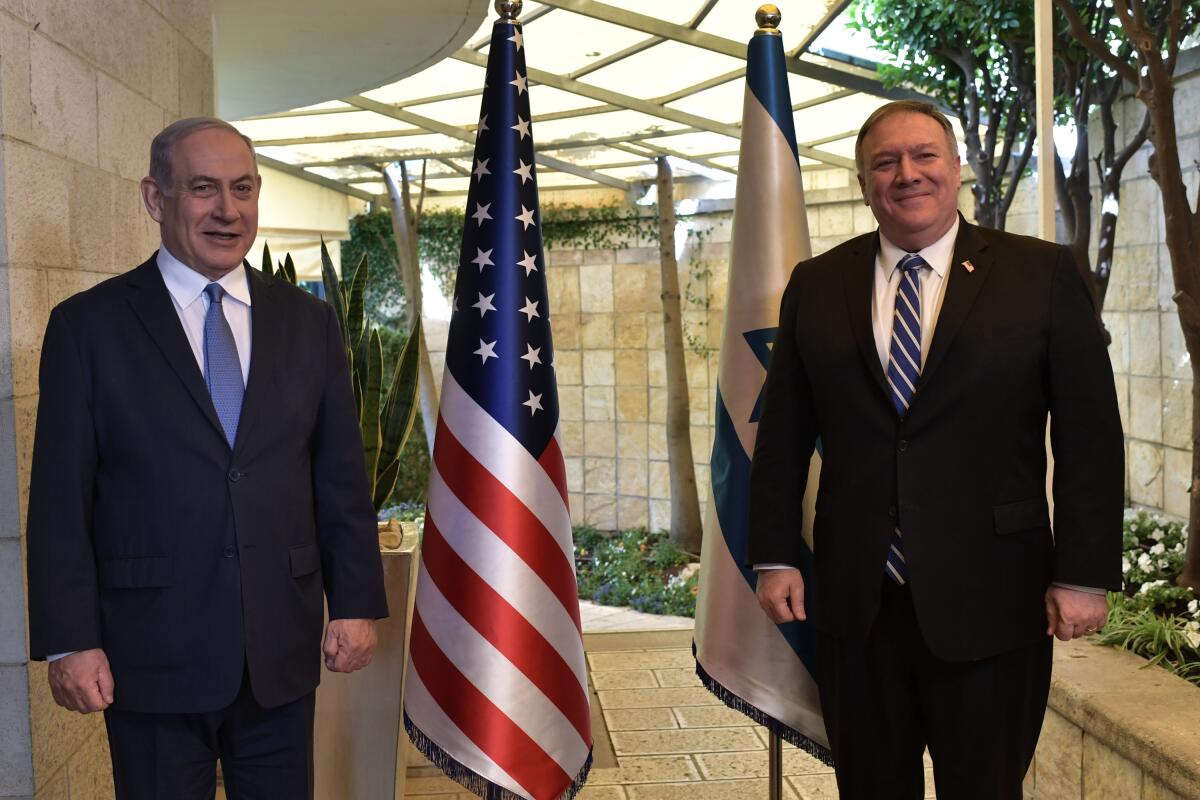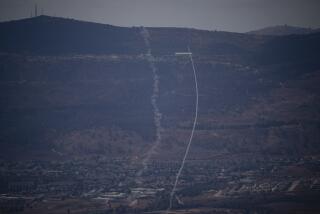Pompeo makes quick trip to Israel to strategize over Iran, Palestinians and China

JERUSALEM — Secretary of State Michael R. Pompeo met Wednesday with top Israeli officials here to lend U.S. support to a fledgling new coalition government and strategize over a range of mutual interests, including Iran, the COVID-19 outbreak and President Trump’s widely panned proposal to resolve the conflict with the Palestinians.
Pompeo’s visit — coming in the midst of a pandemic and only his second trip since the global health crisis began — was also seen as an endorsement of Israel’s plan to annex a large part of the occupied West Bank that Palestinians claim as their homeland.
Stepping off his Air Force jet at Ben Gurion International Airport wearing a red, white and blue face mask, America’s top diplomat said the Trump administration would continue to press for its so-called Vision for Peace, a largely pro-Israel plan that was roundly rejected by Palestinians and most of the Arab world.
“There remains work yet to do, and we need to make progress on that,” Pompeo told Prime Minister Benjamin Netanyahu.
Netanyahu, who will continue as prime minister under a power-sharing agreement scheduled to take effect this week, thanked Pompeo for making the 24-hour round-trip flight to spend six hours on the ground in Jerusalem, meeting separately with him and his soon-to-be governing partner, Benny Gantz.
Netanyahu, standing about six feet from Pompeo at the prime minister’s residence in Jerusalem, but with neither wearing a face mask, said Pompeo’s visit was a “testament to the strength of our alliance [and] to the strength of President Trump’s commitment to the state of Israel.”
Pompeo indicated China would also be on the agenda.
As part of its global effort to confront the growing economic and security threat from China, the Trump administration has pressed U.S. allies, including Netanyahu’s government, to limit Chinese investment in their countries.
“You’re a great partner. You share information, unlike some other countries that try and obfuscate and hide that information, and we’ll talk about that country, too, some,” Pompeo said, referring to China without naming it.
Pompeo has served as the administration’s attack dog in accusing China of intentionally downplaying the early threat of the coronavirus outbreak, allowing it to spread worldwide.
The pair also planned to discuss Iran, with Pompeo referring to its “malign behavior” and the threat he says it poses to Israel. Netanyahu’s government is an especially enthusiastic supporter of the U.S. “campaign of maximum pressure” aimed at isolating Tehran diplomatically and crippling its economy.
At Netanyahu’s urging, Trump pulled the U.S. out of an international accord that had halted Iran’s drive to develop nuclear weapons.
Weighing heavily on Pompeo’s trip was the possibility that Netanyahu will move soon to annex large parts of the West Bank where Israeli Jews over the years have built thousands of homes on land claimed by Palestinians. Most of the international community regards the settlements as illegal, and annexation would be a final and possibly irreversible step by Israel to impose control.
Netanyahu said he would proceed “based on the understandings” he reached with Trump in January during a visit to Washington.
“These are all tremendous challenges and opportunities, and we can do them because we have such a ... powerful bond that makes the alliance between Israel and the United States stand out, certainly for us, but I think for many other countries looking around,” Netanyahu said.
The question takes on urgency because as soon as the new government is sworn in — possibly on Thursday — Netanyahu and Gantz will have to tackle it by July 1 under a complex power-sharing agreement.
Netanyahu has somewhat boxed himself in: He cannot afford to go back on promises made to his right-leaning supporters, including West Bank settlers and others for whom the idea of an independent Palestinian state is anathema. Some voices in the Trump administration, however, continue to hold out hope for eventual negotiations between Israelis and Palestinians.
Annexation would also enrage much of the Arab world, especially neighboring Jordan, one of the few countries in the region that recognizes Israel.
Angering his allies, particularly Saudi Arabia, might be problematic for Trump as well, coming just ahead of his own reelection bid.
Pompeo met with Gantz — the former military chief who fought Netanyahu to a draw in three inconclusive national elections in less than a year — at the Jerusalem residence of the U.S. ambassador to Israel, David Friedman. The ambassador was not present because of what the embassy called a minor respiratory ailment. The embassy said he has tested negative for COVID-19.
Pompeo and Gantz did not issue a public statement. Gantz, who is scheduled to take over as prime minister in 18 months, could throw annexation plans into turmoil by withholding support.
On Wednesday, Gantz and Netanyahu were divvying up Cabinet positions, but late word from the camps was that the process was so contentious that they might not finish in time to swear in the government on Thursday, as Netanyahu said he hoped to do.
One dispute involves the right-wing religious party Yamina, whose leader Naftali Bennett has been health minister. Netanyahu reportedly offered that position to a member of his own Likud Party, infuriating Yamina supporters. Netanyahu insisted he had been generous in offers to Yamina, but since aligning with Gantz, he no longer needs the Bennett faction, which has enjoyed outsized influence.
Meanwhile, France and other European countries said they planned to protest any annexation moves by Israel. The issue will top the agenda at a virtual meeting of European Union foreign ministers on Friday and could include punitive measures like economic sanctions, Joseph Borrell, the head of EU foreign policy, told reporters in Brussels.
“But it’s important for me, for the European Union, for foreign policy, to know what is the position of the member states with respect to the respect of international law,” he said.
Special correspondent Noga Tarnopolsky in Jerusalem contributed to this report.
More to Read
Get the L.A. Times Politics newsletter
Deeply reported insights into legislation, politics and policy from Sacramento, Washington and beyond. In your inbox three times per week.
You may occasionally receive promotional content from the Los Angeles Times.











